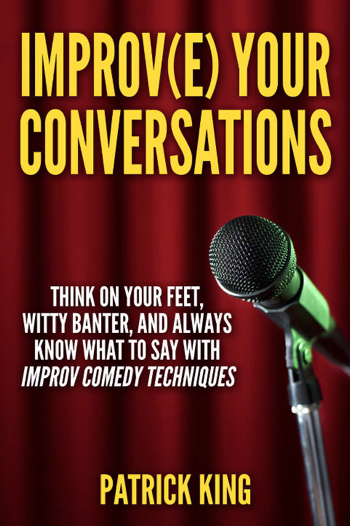 Improve Your Conversations by Patrick King is a book written to help take some of the basic concepts of improv comedy and use them to have better conversations. Well, “better” is a subjective word.
Improve Your Conversations by Patrick King is a book written to help take some of the basic concepts of improv comedy and use them to have better conversations. Well, “better” is a subjective word.
If you have any experience with improv, the stuff written here will be a waste of time. But, if you’re like me, and your only real experience with improv is Whose Line is it Anyway and maybe an improv themed party here or there, then, well, it still might be a waste of time.
The most useful advice found in this book can be pretty clearly extrapolated from the titles of the chapters. For example, Chapter 2: Always say “Yes, AND…” Chapter 3: React every single second. Chapter 4: Use specific statements, not open-ended questions. Chapter 5: Be as present and observant as possible. Chapter 6: Details, details, details. Chapter 7: “No.” is a big no-no…. It starts to repeat itself. The actual chapters hold very little additional, concrete information.
Conversations, is unfortunately, not the right word in this books titles. “Small Talk” would be better. “Improve Your Small Talk”. The problem is that a “conversation” doesn’t necessarily take place for the same reason an improv performance does. Improv is about entertainment—for the audience and the players. Conversations, on the other hand, are often about much more than that. They’re about getting to know one another, finding genuine connections, solving problems. They are not categorically about getting people to like you, or not being bored at a dinner party.
Furthermore, if you were to take this advice and apply it to conversations where anything meaningful is at stake, the advice is downright bad. If you want to get to know someone and want to know what they think about a movie you liked, but they didn’t like, saying “Yes, and…” without being in agreement with that thing you’re about to say, is either dishonest, or linguistically stupid.
“Oh, I hated the Twilight movies because they were so melodramatic”… “Yes, and, wasn’t Kristen Stewart’s performance so dynamic?” That’s nonsense, for multiple reasons. Dynamic was the wrong word, but also, it sounds like you weren’t listening, or you were trying to be sneaky. It’s not going to contribute to a strong social bond. At least, certainly not as well as seeking out the common ground of your disagreement through actual give and take conversation.
The book is not well organized, with the author repeating himself in virtually every chapter. But, there was a solid piece of conversational advice which appeared in multiple chapters. That is, when someone else is speaking, you should not be thinking about the next thing you’re going to say, you should be listening to the other person. All good conversations are improvised, but that doesn’t mean you need to know anything about improv to do it. Good conversations happen naturally when you’re present and listening, speaking when it’s your turn, and speaking in response to what the other person was saying, rather than what you were thinking.
If you follow the advice of a book like this too closely, if you speak from the churning of your mind, rather than the present moment with the person in front of you, your conversation is contrived and inauthentic. While that might even make for a fun conversation, or one where the person walks away having enjoyed themselves, you haven’t necessarily made a connection. You haven’t made progress, you’ve just treaded water for a while.
The book is also riddled with spelling and grammatical errors in virtually every chapter.
So, you can skip this one. Or not. I’m very comfortable in conversation, and perhaps for someone who is not, this will help them understand why and how to get around the discomfort. But I kind of doubt it.

Recent Discussion